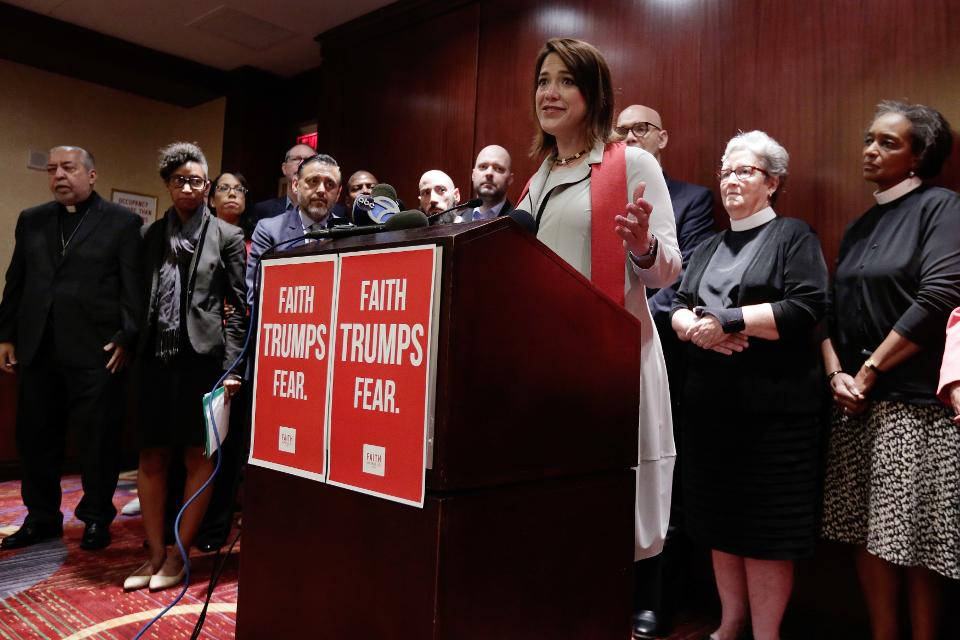First Female Pastor of Renowned Riverside Church Is out after Making Harassment Allegation
By The Natalie Sachmechi
Even in a progressive bastion like New York's Riverside Church — which touts LGBTQ equity, supports immigrants and focuses on environmental justice — one high-ranking woman seems to have been ousted in the aftermath of sexual harassment allegations. The church has been at the forefront of progressive Christian leadership since its inception in 1930. Statues of scientists like Darwin, Galileo and Einstein decorate the building where Dr. Martin Luther King Jr. gave his famous anti-Vietnam War speech in 1967. And in 2004, the church issued a statement in support of same-sex marriage and said it had been performing same-sex ceremonies as early as 1991. In 2014, the church made headlines when it hired its first female senior minister, the Rev. Dr. Amy Butler. She was known as a progressive Christian leader to her followers and “wanted to be known as a pastor who happens to be a woman, not a woman pastor,” she wrote in a blog post. Last week, her name was all over Christian media outlets when news broke that she was stepping down after five years at Riverside — and no one appeared to know exactly why. A statement issued by the church said that she would not be renewing her contract, and Butler called her time at Riverside “one of the greatest honors of my life.” Her critics blamed her leadership style — the New York Post reported that she had taken several of her colleagues to a Minneapolis sex toy shop in May and even gifted one of them a vibrator. Shortly after, a harassment claim was filed against her and an investigation ensued. YOU MAY ALSO LIKE The New York Times, which obtained internal church documents regarding her departure, reported that tensions came after she began exposing harassment against women in the church, including herself. “There is absolutely no doubt that sexism played a role,” Rev. Kevin Wright told the Times. In several blog posts written during her tenure at Riverside, Butler wrote about incidents that left her “deeply uncomfortable” and called on women to speak up about their experiences, citing the #MeToo and #ChurchToo movements. Like the #MeToo movement, #ChurchToo began in 2017 in the aftermath of widespread allegations of sexual abuse within the church. Thousands of clergymen were fired or forced to resign and the Catholic church was heavily scrutinized. Butler filed a formal complaint with the church, after initially deciding not to do so, the Times reported. An outside investigation found that a member of Riverside’s leadership, Dr. Ed Lowe, had engaged in inappropriate behavior, violating the church’s anti-harassment policy by a member of its leadership. In one instance, Lowe gave Butler a bottle of "Sweet Bitch" wine and a similarly branded T-shirt. The church investigation also found that Lowe had sent suggestive texts and emails to other women in the church, according to the Times. A spokesperson for the Riverside Church, however, says that a source close to matter disclosed that the mutual decision not to renew Butler's contract was unrelated to these incidents. The Times also said that Butler was also looking for a salary raise that would bring her $250,000 contract closer to what her predecessor was earning. A role as a church leader can be a difficult course to chart for women. “A woman has a strange dual role to navigate where she can’t misuse her own power, but she is also victimized by someone like [Lowe],” says Dr. Eileen Campbell-Reed, a theologian and seminary professor at Central Seminary in Nashville, Tennesee. According to the 2018 State of Women in Clergy report, women represented just 2.3% of all U.S. clergy in 1960. Since then, they have made steady progress in filling the traditionally male roles in churches. As of 2016, one in five professional clergy in the U.S. is a woman. Still, many denominations, both within Christianity and in other faiths, do not allow women to become ordained as religious leaders. “Socially, sexism has not ended anywhere,” observes Campbell-Reed. “Progressive churches, evangelical churches, Catholic churches, none of them are exempt.” But Campbell-Reed says she does see churches now approaching gender bias in a more forthright manner than in the past, adding that they would be well-advised to take preventative measures rather than waiting for issues to arise. “That doesn’t mean we put people through harassment training and act like that’s enough,” she says. “It needs to be a bigger part of the conversation.” That a church noted for its progressive politics would take such a seemingly unsupportive position in regard to a harassment claim is ironic, but Campbell-Reed is hardly surprised. “If you round up 100 clergywomen in a room,” Campbell-Reed notes, "most of them are going to tell you a story like this one.”
|
.
Any original material on these pages is copyright © BishopAccountability.org 2004. Reproduce freely with attribution.
